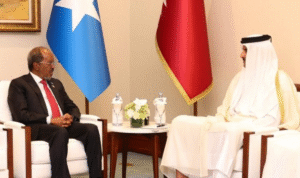Reporting from Somalia, this is AQRI.net bringing you an in-depth analysis of what could be a significant shift in U.S. foreign policy, potentially marking the end of the Obama Doctrine. This development could have far-reaching implications for global diplomacy and international relations.
In recent years, U.S. foreign policy has undergone various changes and adaptations, but the core principles of the Obama Doctrine have largely remained intact since its inception. These principles emphasize diplomacy over military intervention, a focus on multilateral cooperation, and a pivot toward Asia. However, recent actions and statements from Washington suggest a potential departure from these long-standing tenets.
Sources within the U.S. administration indicate that this recalibration may be driven by evolving global challenges and new geopolitical realities that demand a fresh approach. Observers note that recent U.S. diplomatic efforts seem to pivot back toward a more assertive stance, reminiscent of traditional power politics. This change could be reflected in the strengthening of alliances, an increased focus on countering high-stakes threats, and a more strategic use of economic and military power.
Critics argue that moving away from the Obama Doctrine could undermine years of efforts to build international consensus and cooperative strategies addressing issues like climate change, nuclear proliferation, and humanitarian crises. Proponents, however, assert that a recalibrated policy is necessary to ensure U.S. leadership on the global stage remains robust and adaptable to an ever-changing world.
In Somalia, the implications of this potential shift are being closely scrutinized. The region, long affected by internal conflict and external interventions, stands as a litmus test for the broader impact of Washington’s evolving strategy. Stability in Somalia has historically relied on various international peacekeeping efforts and development programs, initiatives that might be reassessed under the new U.S. foreign policy approach.
Local leaders express a mixture of optimism and concern. On one hand, there is hope that a more engaged and decisive U.S. role could bolster regional security and economic development. On the other, there is apprehension about potential unintended consequences that could arise from a shift in U.S. policy priorities, especially if they result in reduced focus on humanitarian assistance and development aid.
The international community remains watchful as additional details about this possible shift in U.S. foreign policy emerge. Ultimately, how these changes unfold will closely impact America’s role on the global stage and its ability to navigate an increasingly complex international landscape.
Stay tuned to AQRI.net for further updates and insights as this story develops.







Comment